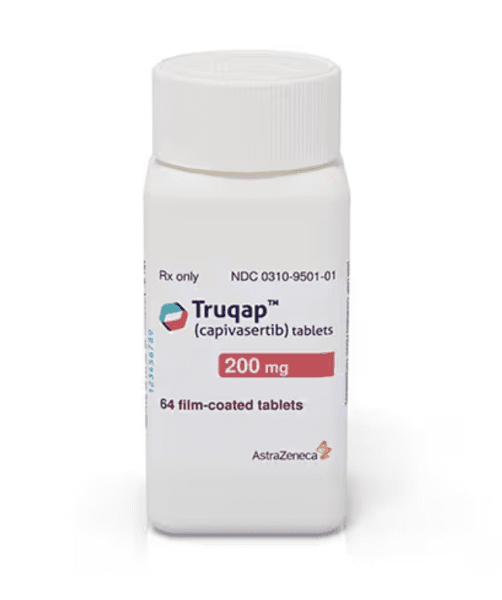Capivasertib Side Effects
Medically reviewed by Drugs.com. Last updated on Jun 10, 2025.
Applies to capivasertib: oral tablets film-coated.
Side effects include:
Most common adverse effects (incidence ≥20%): diarrhea, cutaneous adverse reactions, increased random glucose, decreased lymphocytes, decreased hemoglobin, increased fasting glucose, nausea, fatigue, decreased leukocytes, increased triglycerides, decreased neutrophils, increased creatinine, vomiting, stomatitis.
For healthcare professionals
Applies to capivasertib: oral tablet.
General adverse events
Most common adverse reactions/laboratory abnormalities occurring in at least 20% of patients included diarrhea, cutaneous adverse reactions, increased random glucose, decreased lymphocytes, decreased hemoglobin, increased fasting glucose, nausea, fatigue, decreased leukocytes, increased triglycerides, decreased neutrophils, increased creatinine, vomiting, and stomatitis.
Adverse effects reported are from use of this drug in combination with fulvestrant. Review the manufacturer product information for fulvestrant for additional information on adverse effects.[Ref]
Cardiovascular
- Uncommon (0.1% to 1%): Acute myocardial infarction
Dermatologic
- Very common (10% or more): Cutaneous adverse reactions (up to 56%)
Cutaneous adverse reactions included butterfly rash, dermatitis, generalized exfoliative dermatitis, toxic skin eruption, allergic dermatitis, dry skin, eczema, erythema multiforme, hand dermatitis, palmar-plantar erythrodysesthesia syndrome, pruritus, rash, erythematous rash, maculo-papular rash, papular rash, skin discoloration, skin fissures, skin reaction, skin ulcer, urticaria, purpura, erythema and drug eruption.
Gastrointestinal
- Very common (10% or more): Diarrhea (up to 77%), nausea (up to 35%), stomatitis (up to 25%), vomiting (up to 21%)
- Common (1% to 10%): Dyspepsia
Hematologic
- Very common (10% or more): Decreased lymphocytes (up to 49%), decreased hemoglobin (up to 47%), decreased leukocytes (up to 35%), decreased neutrophils (up to 25%), decreased platelets (up to 12%), anemia (up to 10.4%)
Hepatic
- Very common (10% or more): Increased alanine aminotransferase (up to 23%)
Hypersensitivity
- Uncommon (0.1% to 1%): Hypersensitivity, including anaphylactic reaction
Metabolic
- Very common (10% or more): Increased random glucose/hyperglycemia (up to 60%), increased fasting glucose (up to 37%), increased triglycerides (up to 30%), decreased corrected calcium (up to 19%), decreased appetite (up to 17%), decreased potassium (up to 17%)
- Common (1% to 10%): Increased glycosylated hemoglobin
- Uncommon (0.1% to 1%): Diabetic ketoacidosis
Hyperglycemia included increased blood glucose, increased glycosylated hemoglobin, impaired glucose tolerance, diabetes mellitus, and hyperglycemia.
Nervous system
- Very common (10% or more): Headache (up to 17%)
- Common (1% to 10%): Dysgeusia
- Uncommon (0.1% to 1%): Cerebral hemorrhage
Other
- Very common (10% or more): Fatigue (up to 38%)
- Common (1% to 10%): Mucosal inflammation
- Uncommon (0.1% to 1%): Sepsis
- Frequency not reported: Pyrexia
Renal
- Very common (10% or more): Increased creatinine (up to 19%), urinary tract infection (up to 14%), renal injury (up to 11%)
Renal injury includes acute kidney injury, renal failure, renal impairment, decreased glomerular filtration rate, increased creatinine, and proteinuria.
Respiratory
- Uncommon (0.1% to 1%): Pneumonia aspiration
- Frequency not reported: Pneumonia
See also:
References
1. (2025) "Product Information. Truqap (capivasertib)." Astra-Zeneca Pharmaceuticals
2. (2025) "Product Information. Truqap (capivasertib)." AstraZeneca UK Ltd
3. (2024) "Product Information. Truqap (capivasertib)." AstraZeneca Pty Ltd, 2
More about capivasertib
- Check interactions
- Compare alternatives
- Reviews (1)
- Dosage information
- During pregnancy
- Drug class: multikinase inhibitors
- Breastfeeding
- En español
Patient resources
Other brands
Professional resources
Other brands
Related treatment guides
Further information
Capivasertib side effects can vary depending on the individual. Always consult your healthcare provider to ensure the information displayed on this page applies to your personal circumstances.
Note: Medication side effects may be underreported. If you are experiencing side effects that are not listed, submit a report to the FDA by following this guide.

